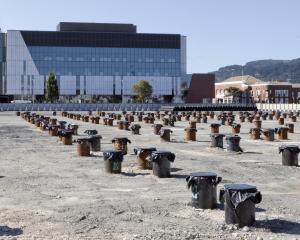Parliamentary Commissioner for the Environment Jan Wright's report on sea-level rise has caused warning bells to be rung in Dunedin which has about of a third of the homes identified nationally as being at risk.
The report recommends New Zealand completely overhauls the way it is preparing for rising sea levels and showed 9000 homes nationally are within 50cm of sea level at the high spring tide.
In Dunedin, 2683 homes have been identified as being at risk. Climate change debate continues to divide communities - even in Dunedin.
Forces aligned with the most overwhelming of science data find themselves battling with those who find other scientific proof the globe is not warming.
But the number of extreme weather events noted just this year alone indicate something is seriously awry with the climate.
New Zealand is due to face an increasingly common event again this summer - El Nino.
Dr Wright says the Government needs to start preparing for the huge potential cost of rising oceans driven by climate change, which may lead to the managed retreat of coastal communities to higher ground.
It is hard to think of large swathes of South Dunedin, St Kilda and St Clair as coastal communities when those parts of Dunedin are such integral parts of the city at large.
Finance Minister Bill English, while not dismissing the report from Dr Wright out of hand, indicated the Government has more pressing issues to consider at present.
And it will be true Mr English will be well gone from Parliament before any of the predictions come true but that makes it no less important as an issue.
However, climate change researchers say the report makes it clear the minister of finance needs to address the economic and fiscal risks that can be caused by sea-level rise.
One of the key aspects of the report is central government needing to provide a much clearer sense of direction and guidance to local government.
Until that is done, local governments are faced with continual dispute and litigation and are more inclined to defer dealing with the problem.
The commissioner's final recommendation to appoint a working group to prepare for the economic and fiscal implications of sea-level rise is crucial.
Equally crucial is the need for funding to be made available for local councils to generate the information necessary at a local scale to bolster planning and management decisions considering the impacts of sea-level rise.
Houses in South Dunedin were flooded earlier this year and the latest report will concern residents - some of whom are still awaiting a return to their homes.
New Zealanders, in general, have a laissez faire attitude to government interference in their lives.
But in this case, it behooves both central and local government to start making plans.
Calls for the report to start a conversation with South Dunedin residents about what should happen are wasted.
Only the most engaged of residents will take part in a talkfest which will find no conclusions.
If, eventually, residents need to leave the identified at-risk areas, planning needs to happen about where those people will go.
Implications for the Dunedin City Council's district and infrastructure plans will be large.
The most likely of scenarios is an expansion on to the Taieri Plain.
In Christchurch and Kapiti, debate had been particularly adversarial as local government clashed with residents over plans to prepare for higher sea levels.
So before the panic sets in, there needs to be some common sense implemented.
Sea levels have risen about 20cm on average since the beginning of the 20th century.
The seas around New Zealand have risen in line with the global average but may rise more quickly in the future.
There has been too much talking for no result.
It is time to act but action needs to start sooner rather than later.












